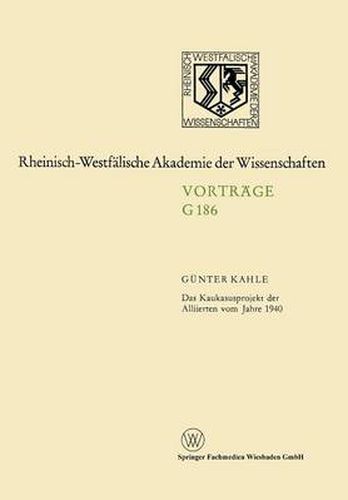Readings Newsletter
Become a Readings Member to make your shopping experience even easier.
Sign in or sign up for free!
You’re not far away from qualifying for FREE standard shipping within Australia
You’ve qualified for FREE standard shipping within Australia
The cart is loading…






This title is printed to order. This book may have been self-published. If so, we cannot guarantee the quality of the content. In the main most books will have gone through the editing process however some may not. We therefore suggest that you be aware of this before ordering this book. If in doubt check either the author or publisher’s details as we are unable to accept any returns unless they are faulty. Please contact us if you have any questions.
From October 1939 on, the British and French general staff discussed possibilities for joint military action agairrst the Soviet Union as a potential ally of the German Reich. Apart from weakening the USSR such action was to reinforce the economic blockade agairrst Germany. An allied expedition- ary corpswas to be organized under the socalled Northplan ; the engage- ment of this corps in Scandinavia was to lead to an easing of the military pressure on the Finns in the winter campaign of 1939/40 and also to a command of the North Swedish ore deposits. In January, 1940, the Allied Chiefs of Staff began to consider a parallel Southplan , and serious pre- parations for its execution were begun in March. lts aim was to launch a joint English-French attack, if possible with Turkish support, on the Soviet oil centres in the Caucasus Mountains. Such an attack by the French General Headquarters - set for the end of June or beginning of July, 194- became pointless after the German offensive agairrst France in May, 1940. The English took up the Southplan again after the French surrender, and discussions of its possibilities can be traced up to a few days before the German attack on the Soviet Union in June, 1941. Resurne Depuis octobre 1939, les etats-majors generaux britannique et fran ais ont discute a maintes reprises de mesures militaires contre l'Union Sovieti- que en tant qu'allie potentiel du Reich allemand.
$9.00 standard shipping within Australia
FREE standard shipping within Australia for orders over $100.00
Express & International shipping calculated at checkout
This title is printed to order. This book may have been self-published. If so, we cannot guarantee the quality of the content. In the main most books will have gone through the editing process however some may not. We therefore suggest that you be aware of this before ordering this book. If in doubt check either the author or publisher’s details as we are unable to accept any returns unless they are faulty. Please contact us if you have any questions.
From October 1939 on, the British and French general staff discussed possibilities for joint military action agairrst the Soviet Union as a potential ally of the German Reich. Apart from weakening the USSR such action was to reinforce the economic blockade agairrst Germany. An allied expedition- ary corpswas to be organized under the socalled Northplan ; the engage- ment of this corps in Scandinavia was to lead to an easing of the military pressure on the Finns in the winter campaign of 1939/40 and also to a command of the North Swedish ore deposits. In January, 1940, the Allied Chiefs of Staff began to consider a parallel Southplan , and serious pre- parations for its execution were begun in March. lts aim was to launch a joint English-French attack, if possible with Turkish support, on the Soviet oil centres in the Caucasus Mountains. Such an attack by the French General Headquarters - set for the end of June or beginning of July, 194- became pointless after the German offensive agairrst France in May, 1940. The English took up the Southplan again after the French surrender, and discussions of its possibilities can be traced up to a few days before the German attack on the Soviet Union in June, 1941. Resurne Depuis octobre 1939, les etats-majors generaux britannique et fran ais ont discute a maintes reprises de mesures militaires contre l'Union Sovieti- que en tant qu'allie potentiel du Reich allemand.